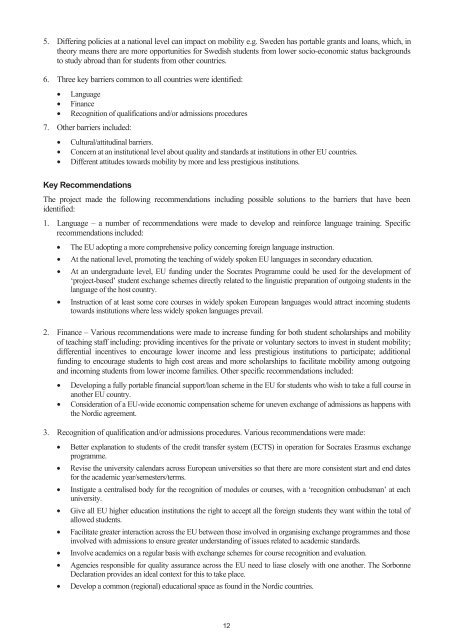briefing papers for policy makers
briefing papers for policy makers
briefing papers for policy makers
Create successful ePaper yourself
Turn your PDF publications into a flip-book with our unique Google optimized e-Paper software.
5. Differing policies at a national level can impact on mobility e.g. Sweden has portable grants and loans, which, in<br />
theory means there are more opportunities <strong>for</strong> Swedish students from lower socio-economic status backgrounds<br />
to study abroad than <strong>for</strong> students from other countries.<br />
6. Three key barriers common to all countries were identified:<br />
• Language<br />
• Finance<br />
• Recognition of qualifications and/or admissions procedures<br />
7. Other barriers included:<br />
• Cultural/attitudinal barriers.<br />
• Concern at an institutional level about quality and standards at institutions in other EU countries.<br />
• Different attitudes towards mobility by more and less prestigious institutions.<br />
Key Recommendations<br />
The project made the following recommendations including possible solutions to the barriers that have been<br />
identified:<br />
1. Language – a number of recommendations were made to develop and rein<strong>for</strong>ce language training. Specific<br />
recommendations included:<br />
• The EU adopting a more comprehensive <strong>policy</strong> concerning <strong>for</strong>eign language instruction.<br />
• At the national level, promoting the teaching of widely spoken EU languages in secondary education.<br />
• At an undergraduate level, EU funding under the Socrates Programme could be used <strong>for</strong> the development of<br />
‘project-based’ student exchange schemes directly related to the linguistic preparation of outgoing students in the<br />
language of the host country.<br />
• Instruction of at least some core courses in widely spoken European languages would attract incoming students<br />
towards institutions where less widely spoken languages prevail.<br />
2. Finance – Various recommendations were made to increase funding <strong>for</strong> both student scholarships and mobility<br />
of teaching staff including: providing incentives <strong>for</strong> the private or voluntary sectors to invest in student mobility;<br />
differential incentives to encourage lower income and less prestigious institutions to participate; additional<br />
funding to encourage students to high cost areas and more scholarships to facilitate mobility among outgoing<br />
and incoming students from lower income families. Other specific recommendations included:<br />
• Developing a fully portable financial support/loan scheme in the EU <strong>for</strong> students who wish to take a full course in<br />
another EU country.<br />
• Consideration of a EU-wide economic compensation scheme <strong>for</strong> uneven exchange of admissions as happens with<br />
the Nordic agreement.<br />
3. Recognition of qualification and/or admissions procedures. Various recommendations were made:<br />
• Better explanation to students of the credit transfer system (ECTS) in operation <strong>for</strong> Socrates Erasmus exchange<br />
programme.<br />
• Revise the university calendars across European universities so that there are more consistent start and end dates<br />
<strong>for</strong> the academic year/semesters/terms.<br />
• Instigate a centralised body <strong>for</strong> the recognition of modules or courses, with a ‘recognition ombudsman’ at each<br />
university.<br />
• Give all EU higher education institutions the right to accept all the <strong>for</strong>eign students they want within the total of<br />
allowed students.<br />
• Facilitate greater interaction across the EU between those involved in organising exchange programmes and those<br />
involved with admissions to ensure greater understanding of issues related to academic standards.<br />
• Involve academics on a regular basis with exchange schemes <strong>for</strong> course recognition and evaluation.<br />
• Agencies responsible <strong>for</strong> quality assurance across the EU need to liase closely with one another. The Sorbonne<br />
Declaration provides an ideal context <strong>for</strong> this to take place.<br />
• Develop a common (regional) educational space as found in the Nordic countries.<br />
12


